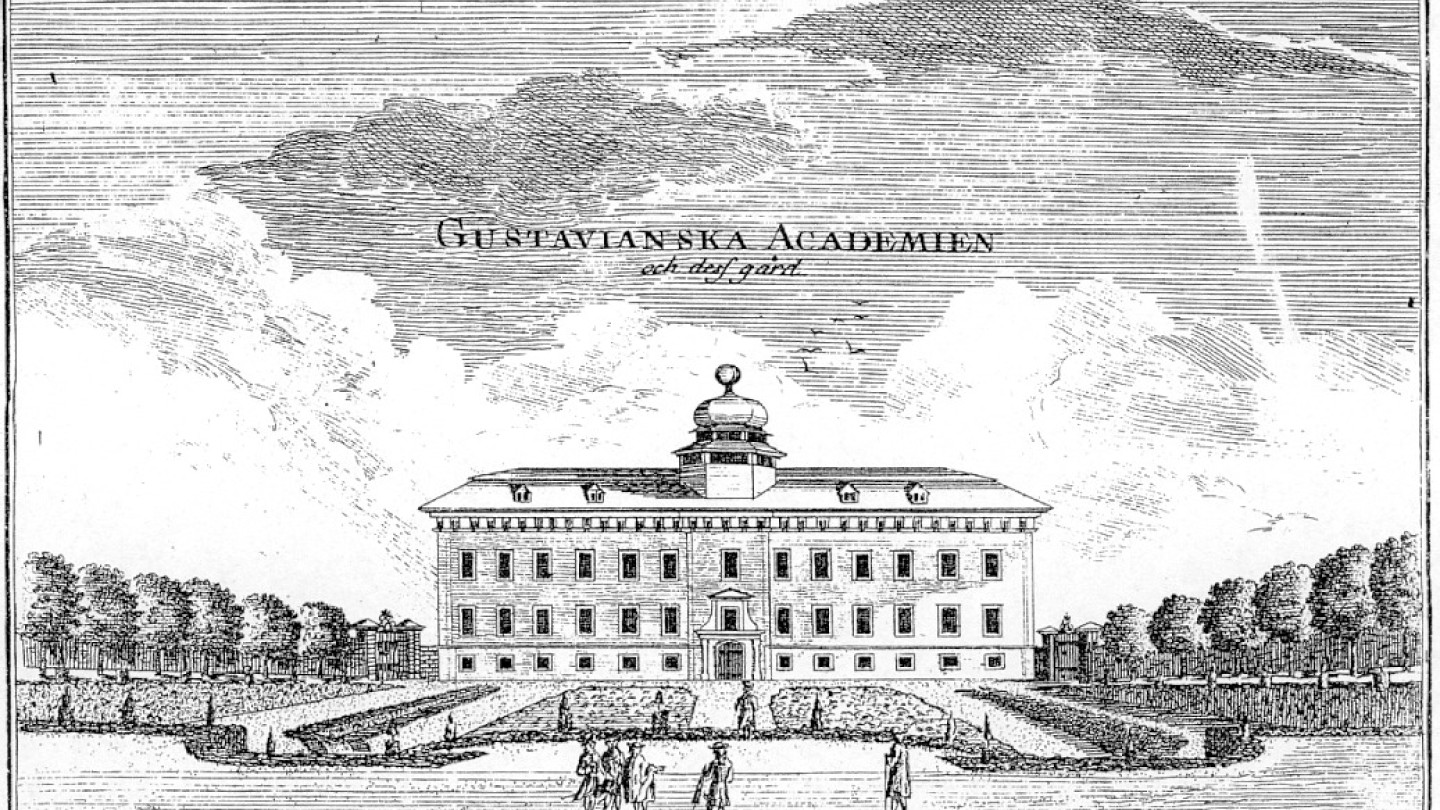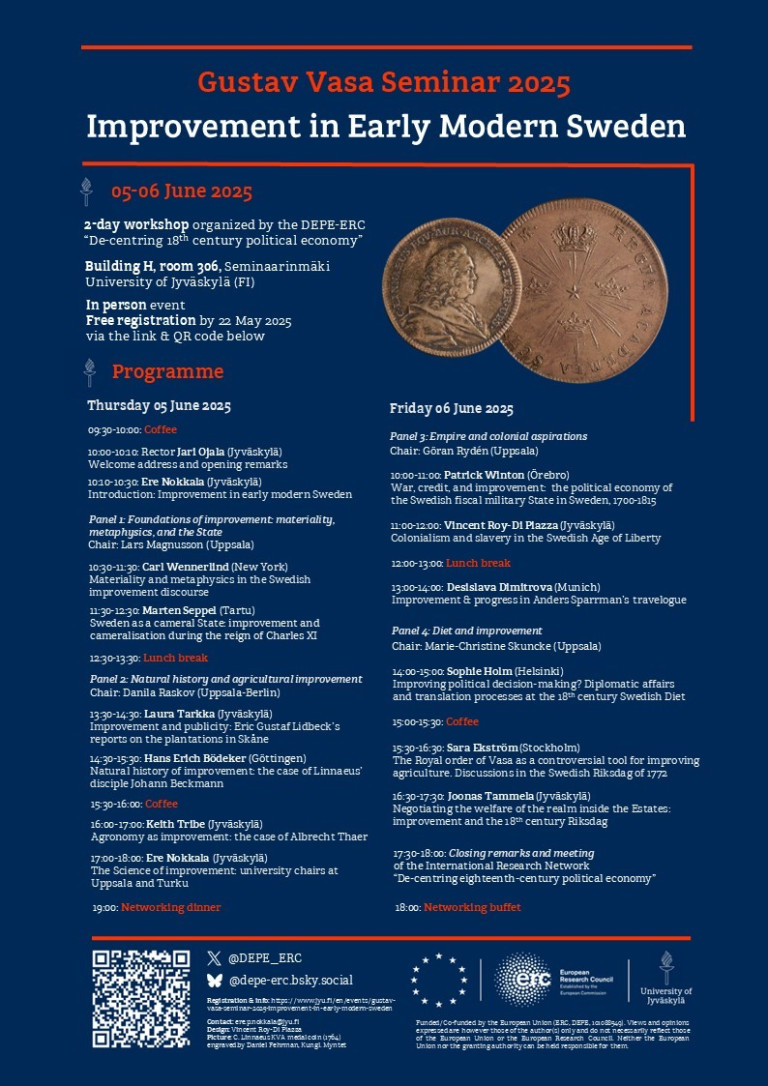ABSTRACTS
Gustav Vasa Seminar 2025: Improvement in Early Modern Sweden, 5 – 6 June 2025, University of Jyväskylä
Materiality and Metaphysics in the Swedish Improvement Discourse
Carl Wennerlind (Barnard College)
For Sweden to bolster its newfound geopolitical prominence, it had to develop a strong economic foundation. The Queen, the Lord High Chancellor, the Chancellor of Uppsala University, and the most prominent industrial mogul were all engaged in finding the best strategy for improvement. There was a general recognition that Sweden’s best path to economic enrichment was through the exploitation of its abundant natural resources – its arable land, forests, fisheries, and mines. In addition to surveying and drawing up inventories, it was essential to develop a better understanding of how the nation’s natural resources could be refined, processed, and extracted. Turning nature into economic wealth thus required advancements in knowledge about materials and energy. But there was no agreement as to the materiality of wealth; both Cartesian and Paracelsian ideas circulated in Sweden during the seventeenth century. In this paper, I will explore the clash of ideas at the root of the Swedish political economy of improvement.
Sweden as a Cameral State: Improvement and Cameralisation during the Reign of Charles XI
Marten Seppel (University of Tartu)
The reign of Charles XI (1660–1697) was characterised by a dominant cameral-economic policy. It has been suggested that fiscal and reduction policies were of particular interest to King Charles XI. Stellan Dahlgren has argued that Charles XI and his government adopted the principles of cameralist economic thought. We cannot however identify any direct influence of cameralist doctrine in the last two decades of the 17th century. For this reason, those cameralist tendencies observed during Charles XI’s reign are more appropriately referred to in this paper as "cameralisation."
During Charles XI’s rule the Chamber College (Kammarkollegiet) became one of the central and leading governmental institutions. As one of Sweden’s oldest administrative bodies, its origins can be traced back to the first half of the 16th century. During Charles XI’s period of rule the Chamber College remained the king’s primary advisory body. It was responsible for drafting the majority of royal decrees and regulations concerning the administration of state finances and domains. In principle, nearly all economic matters brought before the central government in Stockholm passed in some way through the Chamber College –whether concerning agriculture, forestry, industry or mining. Although other institutions, such as the Mining College, the Budget Office, different commissions, and provincial administrations, also played roles in these areas, the Chamber College remained a key institution in economic governance. This paper examines the activities of the Chamber College, particularly during the final decades of Charles XI’s reign, and concludes that, even in the late 17th century, traces of cameralist doctrine within the institution were minimal. Therefore, there is no justification for classifying Sweden as a cameralist state.
However, considering the centrality of cameral-economic concerns, the concept of a "cameral state," as proposed in this paper, is far more appropriate. This notion does not seek to challenge the prevailing historiographical framework of the "fiscal-military state," which has dominated the study of early modern European governance over the past three decades. Rather, it aims to underscore the fact that the interests of the state and of the Chamber College extended beyond taxation and militarisation in its narrow sense. Instead, cameralisation encompassed a much broader spectrum of economic concerns, improvements, and the management of all domestic resources.
Improvement and Publicity: Eric Gustaf Lidbeck’s Reports on the Plantations in Skåne
Laura Tarkka (University of Jyväskylä)
In mid-eighteenth-century Sweden printed summaries of the decisions of the Diet often included a Swedish equivalent of the word “plantation”. Following Carl Linnaeus’ travels in Skåne in 1749, the idea of setting up plantations of mulberry trees, dye-yielding plants, and medicinal plants in this region became prevalent in public discourse; but how did this happen? Eric Gustaf Lidbeck, who was appointed Professor of Natural History at Lund University and Director of all plantations in Skåne in 1756, is well known for his dedication to the eventually unsuccessful project of establishing sericulture in Sweden. Less attention has, however, been paid to his method of promoting improvements. This paper will therefore focus on Lidbeck’s collaboration with Carl Christoffer Gjörwell in the periodical Den Swänska Mercurius. Juxtaposing Lidbeck’s public reports with what was written about him in the protocols of the Estates and in Riksdags-Tidningar, this paper argues that Lidbeck not only used print media to secure public funding for his improvement projects but, at the same time, let the public follow their progress. In this case, therefore, publicity links improvement with accountability.
Natural History and Improvement: The Case of Linnaeus’s Disciple Johann Beckmann
Hans Erich Bödeker (Göttingen)
Johann Beckmann taught economics at Göttingen university from 1767 to 1811. Under the outstanding influence of Linnaeus, whose disciple he had been, he conceived of economics as applied natural history. Beckmann’s cognitive interest focused on the process of transforming raw materials into commodities. In addition to the extraction and cultivation of natural resources (in his theory of agriculture) he focused on the processing of raw materials, on the production of goods (in his technology) and incorporated the results of his research into macroeconomic considerations. He was concerned with more than the mere application of recognized insights or productive abilities; his arguments aimed at the combination of theory and practice directed towards innovation and reform. That he was able to think in the medium of reform was based on his partial overcoming of the idea of the productivity of nature by that of man. However, Beckmann’s reform orientation had its limits, both in terms of economic theory and socio-political objectives.
Agronomy as Improvement: The Example of Albrecht Thaer
Keith Tribe (University of Jyväskylä)
In 1798 Albrecht Thaer published the first part of his multivolume work, Einleitung zur Kenntniß der englischen Landwirthschaft und ihrer neueren practischen und theoretischen Fortschritte in Rücksicht auf Vervollkommnung deutscher Landwirthschaft für denkende Landwirthe und Cameralisten. As the title makes plain, the intention was to apply the “practical and theoretical” advances of English agriculture to the improvement, or perfection, of German agriculture. He treated recent English agricultural writing as exemplary, a “model” to be learned from, if not followed to the letter. In the course of writing the book Thaer’s project shifted: rather than review what might be learned from the English, developing instead a broadly comparative framework, considering more generally how practices typical of one farming region might or might not be applicable to others. In this way he laid the foundations for a new science of agronomy. This was associated with his formulation of a “rationelle Wirtschaftslehre”, not a “rational” economics but an “economics of efficiency”. Here there is a distinct overlap with Beckmann’s Technologie.
My presentation will outline quite what it was that Thaer considered exemplary about English agriculture, and the work of writers like William Ellis, Arthur Young and William Marshall whose ostensible readership was the “thinking farmer”, in Verena Lehmbrock’s formulation. Thaer's literary project soon became a teaching project, then transmuting into the publication of a journal, the foundation of a research institute, and his appointment in 1810 as Professor of the Cameralistic Sciences at the new University of Berlin. In this role he played a major part in placing agricultural improvement upon a formal scientific basis, turning the experimental approach of Arthur Young into an institutionalised form of knowledge capable of wider dissemination.
The Science of Improvement in Uppsala and Turku
Ere Nokkala (University of Jyväskylä)
The paper studies the emergence of academic politico-economic discourse at the Swedish universities, and explores in this context the dynamic relationship between “economic sciences”, natural history and natural law. I place Swedish chairs of “cameral sciences” in a wider European context, and present a new interpretation of the similarities and differences between the Swedish chairs founded in Uppsala (1741) and Turku (1747) and the first chairs founded in Halle and Frankfurt an der Oder in 1727. The paper ends with a case study of Turku Professor Pehr Adrian Gadd’s (1727–1797) views on the improvement of agriculture inspired by Johann Beckmann and Arthur Young.
War, credit and improvement: the political economy of the fiscal-military state in Sweden, 1700–1815
Patrik Winton (Örebro University)
According to many existing narratives, the eighteenth century witnessed a decline of Sweden’s position in the European states system as it tried to come to terms with a rising Russian Empire in the east and a growing Prussian state in the south. According to the same narratives, Sweden tried to compensate for this declining geopolitical position by expanding long-distance trade in Asia, the Americas and the Mediterranean, and by promoting internal cultivation. Unlike the bellicose seventeenth century, wars and preparations for wars have therefore not been seen as drivers of economic, political and social developments in Sweden during the eighteenth century, even though Sweden participated in several of the major conflicts during the period 1700–1815: the Great Northern War (1700–1721), the Russo-Swedish War of 1741–1743, the Seven Years’ War (1757–1762), the Russo-Swedish War of 1788–1790 and the Napoleonic Wars (1805–1814). In my presentation, I will show that the narrative of decline is too simplistic, and that there were several changes made in both the financial and military infrastructure to improve the capacity of the Swedish state to cope with the changing international states system. I will pay particular attention to the system of credit and its implications for warfare; but the capacity of the military to procure necessary goods will also be examined.
Colonialism and Slavery in the Swedish Age of Liberty
Vincent Roy-Di Piazza (University of Jyväskylä)
Sweden’s embrace of transatlantic slavery during the Gustavian era was built on five decades of previously unsuccessful aspirations to resume territorial expansion at home and abroad. Swedish colonial aspirations during the Age of Liberty were torn between political revanchism, neo-imperialist ambitions of global influence, international competition, and hopes to improve the kingdom’s development during a period of economic reconstruction. In this paper, I outline debates about colonial aspirations and slavery in Sweden during the period, showing how they branched across politics, religion, and scholarship to form a distinct part within the larger improvement discourse.
Improvement and progress in Anders Sparrman’s travelogue
Desislava Dimitrova (Munich)
In his travelogue Resa Till Goda Hopps-Udden, Södra Pol-kretsen Och Omkring Jordklotet, Samt till Hottentott- och Caffer-Landen, Åren 1772-76, published in three parts in 1783, 1802 and 1818, Swedish physician, naturalist and Linnaeus apostle Anders Sparrman (1748 – 1820) addresses 18th -century ‘economic stages’ theories, improvement measures and their link to ideas of societal and moral progress, among other things. Like many contemporary naturalists, Sparrman was also interested in new resources, products, production techniques and medical treatments about which he learned during his travels in Southern Africa and the South Pacific. This paper discusses his suggestions for economic improvements in Sweden and the various parts of the world he visited, as well as the connections between natural history and political economy as presented in his journal. To this end, the original Swedish text is analyzed from a historicist and philological point of view, with a focus on the history of ideas and science.
Diplomatic affairs, translation processes and political decision-making at the eighteenth-century Swedish Diet – Tackling the archives of the Secret Committee
Sophie Holm (Max Weber Network Eastern Europe)
In eighteenth-century Sweden foreign policy was parliamentarized during the so-called ‛Age of Liberty’ (1719–1772), creating a contrast with the Kabinettspolitik prevalent in most other European countries. The Swedish Diet had comparatively extended executive power, including over foreign affairs, a function typically not performed by early-modern parliaments. Matters related to diplomacy and state finances were mainly decided in the Diet’s Secret Committee, which functioned as a miniature Diet within the Diet. The archives of the Secret Committee are a vast collection of manuscripts (minutes, pro memorias, received documents) reflecting the sometimes complicated turns in the decision-making processes of the Diet. In the DFG-funded project Languages of Eighteenth-Century Russian Diplomacy in European Context, these archives have been used to explore the interrelationship between foreign language skills and political agency. This case study will be presented together with some reflections on the Secret Committee minutes as a source for parliamentary history.
The royal Order of Vasa as a controversial tool for improving agriculture. Discussions in the SwedishRiksdag 1772
Sara Ekström (Stockholm University)
During Gustav III of Sweden’s coronation in May of 1772 he established a chivalric order, the Order of Vasa. This Order was intended for subjects not included in the three existing royal orders: those who worked in agriculture, mining, trade and the arts. The principal emphasis was on agriculture. Not even the highest degrees of the Order of Vasa were reserved for the nobility, as in the three other royal orders of knighthood.
The objective of the Order of the Vasa, as stated by the king, was to direct the subjects’ desire for honour towards the improvement of agriculture. Desire for honour had been part of Aristotelian virtue theory since antiquity. However, this was a time when ideas of honour were renegotiated. Gustav III sought to place the self-interest and desires of citizens in a state of competition, so that desirable effects could be achieved. However, encouraging this kind of self-interested honour was not generally accepted as a morally correct way for improving agriculture.
The establishment of the Order of Vasa thus triggered a discussion in parliament. Opponents claimed that the Order of Vasa would create jealousy, dissatisfaction and vanity. Instead of being driven by the desire to distinguish themselves from others, subjects should – according to the opponents – be driven ideally by calm and satisfied emotions, emanating from the fulfilment of one’s duty. Self-interested affects and desires were considered to be counterproductive to social benefit and virtue. The Order of Vasa appears to have been particularly provocative for two reasons. Firstly, it was perceived as encouraging a “wrong” kind of honour, that is, an honour for personal gain, rather than honour as a reward of virtue. Secondly, the Order was controversial since it would include broader categories of the population (or so it was presented). There were recurring formulations in the parliamentary discussions of how problematic it would be “among equals” for someone to have a decoration conferred on them, possibly leading to unrest and discord, especially among the peasants.
Negotiating the welfare of the realm inside the Estates: Improvement and the 18th century Riksdag
Joonas Tammela (University of Jyväskylä)
My paper examines the ways in which, during the 18th century, the linguistic conventions associated with improvement were tied to the themes that each of the four Estates (i.e., Nobility, Clergy, Burgers, Peasants) itself considered crucial to the realm and its welfare. Improvement (förbättring) was a central concept in early modern economic discourse. In the Swedish Diet (Riksdag) during the 18th century the concept was linked to arguments over how the political decisions and reforms under discussion could be seen as improving the condition of the realm.
The way in which the concept of improvement was used and perceived was strongly influenced by the different Estates’ self-understanding of their role in society. In the internal discussions of the Estates the meaning of improvement was defined through the supposed interest of the given Estate. When the Estates convened – such as in committees (utskott), delegations (deputation), and less frequent plenary sessions (plenum) – interest-based conflicts became unavoidable. Here I concentrate on what it meant to improve conditions in the realm, as expressed by the Estates in their internal discussions (ståndens riksdagsprotokoll) from the era of the Great Northern War up to the 1800 Diet.







